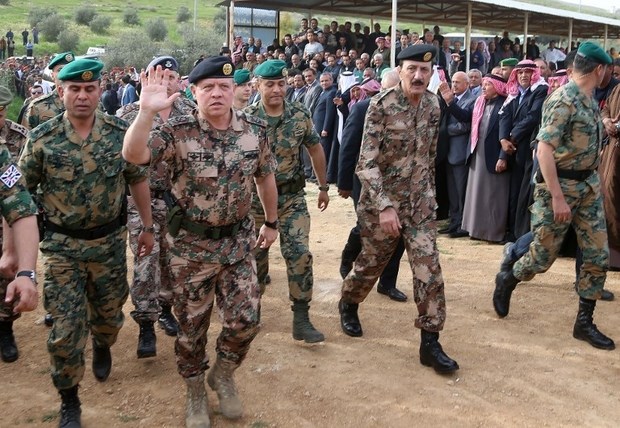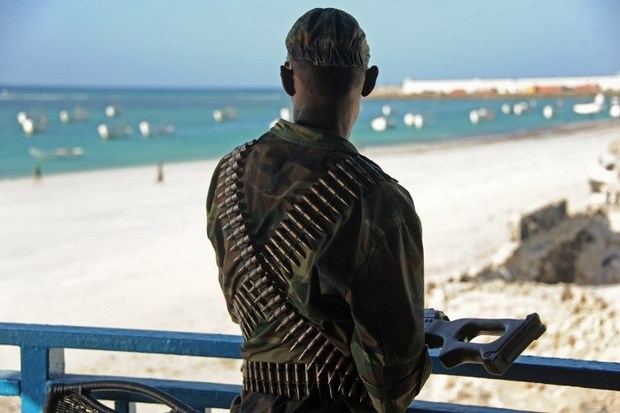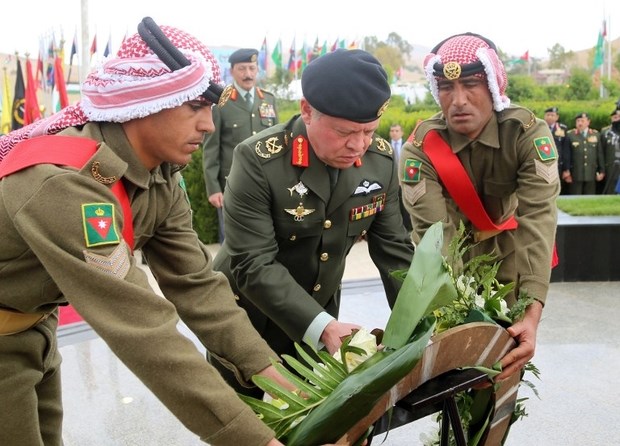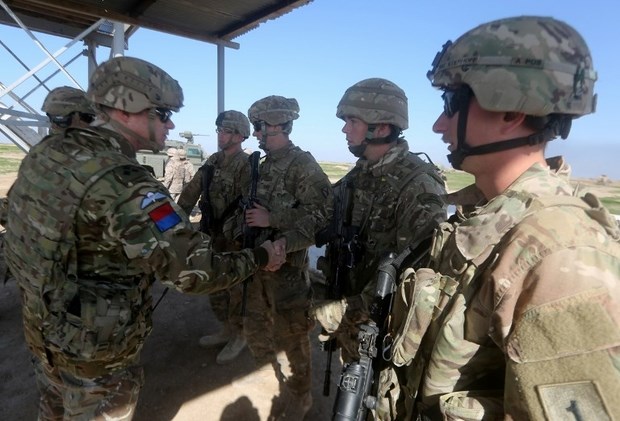British and Jordanian special forces are secretly working together to target militant groups operating in war-torn Somalia, Middle East Eye can reveal. Jordanian King Abdullah II Ibn Hussein told US congressional leaders in the week of 11 January that his kingdom’s forces had turned to Britain in the fight against Islamic State because of a lack of direction from Washington.
Jordanian King Abdullah II Ibn Hussein told US congressional leaders in the week of 11 January that his kingdom’s forces had turned to Britain in the fight against Islamic State because of a lack of direction from Washington.
“The UK’s SAS is now getting involved in operations with Jordanian special forces,” he said, according to a detailed account of the meeting seen by MEE.
“Jordan is looking at Al-Shabaab because no one was really looking at the issue, and we cannot separate this issue, and the need to look at all the hot spots in the map,” the king added, referring to the Islamist militant group that is based in Somalia and which both IS and al-Qaeda seek to have influence over.
“We have a rapid deployment force that will stand with the British and Kenya and is ready to go over the border [into Somalia].”
Abdullah said that “we started with Al-Shabaab, as they feed into Libya,” where chaos and conflict have reigned since the Nato-backed 2011 overthrow of Muammar Gaddafi.
The Jordanian king also revealed in his Washington meeting that his Special Forces troops were going to be embedded with the SAS in operations in Libya.
The meeting was with a large gathering of senior American politicians including John McCain and Bob Corker, who each attended with their respective Armed Services and Foreign Relations committees.
It took place during a visit in which Abdullah held a slew of high-level meetings, including with Secretary of State John Kerry and Secretary of Defence Ashton Carter, but not with President Barack Obama, who was forced to say he hadn’t snubbed the king and that he didn’t meet him because of “scheduling conflicts”.
‘The outlaws of Islam’
In the meeting with Congressional leaders Abdullah repeatedly expressed his frustration with America over what he said was their inaction against IS, a group who he said represents the beginning of the third world war.
“We focus on the bigger picture and we are in world war against terror, inside Islam with the outlaws of Islam,” he said.
While much of the meeting was taken up with discussing the war in Syria, Abdullah told the Americans that the focus on IS there has led to a significant militancy problem being ignored in East Africa.
Abdullah said that the international community is “walking and chewing gum” in East Africa, suggesting that there is a blindness to the threat of IS and other similar groups, and he claimed that “no one is listening to African countries”.
Militancy in Somalia has flourished in a country that has been wracked by decades of conflict. Al-Shabaab ruled large parts of the country until 2011 when they were pushed out of the capital Mogadishu by a coalition of African Union and Somali troops.
Since then the group has operated primarily out of the country’s central and southern regions and has been credited with carrying out high-profile attacks both domestically and in neighbouring Kenya, where in April 2015 Al-Shabaab militants killed 147 people, who were mostly students, at Garissa University in north-east Kenya. A Somali soldier looks at the Lido beach from the terrace of the Lido seafood restaurant on 22 January 2016 following an overnight attack (AFP)
A Somali soldier looks at the Lido beach from the terrace of the Lido seafood restaurant on 22 January 2016 following an overnight attack (AFP)
Abdullah told the American politicians that after the university attack Kenyan President Uhuru Kenyatta “had tears in his eyes because of the over hundred students that were massacred at a university and no one responded.”
In an attempt to convince the Americans of how large a problem he views IS, Abdullah declared that the war against Islamist militancy is one that stretches from Indonesia to California.
“The problem is bigger than ISIL, this is a third world war, this is Christians, Jews working with Muslims against Khawarej, outlaws,” the king said, using an alternative acronym for IS, and referring to an early schismatic Islamic sect known for killing Muslims who they declared to have left the faith.
Abdullah lamented what he perceived as a “piecemeal approach” by the international community – specifically the US – on tackling the threat posed by IS and other affiliated groups.
While he acknowledged that the fight against Islamist militancy should be a “home grown effort” he said it was vital to have strong international support, and despite his criticisms of US strategy, he praised Washington for providing military hardware to allied countries.
“The US is supplying the equipment and we are coordinating the efforts and once we get beyond the politicians, the staffers get things done,” he said.
Jordan has the ‘niche skills’
But Abdullah said that he had turned to the British for support because Washington was being too cautious in taking on IS.
Abdullah has rich military experience and close connections to the British armed forces.
He trained as a special forces officer at Britain’s Royal Military Academy Sandhurst in 1980, before briefly serving as a British army officer.
Since becoming king in 1999, Abdullah has sought to develop Jordan’s special forces as a respected elite force and he has positioned Amman as a key regional site for the defence industry through hosting an annual military exhibition called SOFEX, which allows arms companies to show off their latest high-tech equipment.
“Jordan has some of the best-trained special forces in the Middle East,” Shashank Joshi, a senior research fellow at the London-based Royal United Services Institute, told MEE.
Joshi said it was unsurprising to him that Jordan and Britain would cooperate on military matters given their closeness, adding that Jordanian troops may have the “niche skills” required to operate in East Africa against Islamist groups whose members speak Arabic.
However, he did express surprise that Abdullah “would have an interest in being drawn into Kenya”. Jordan’s King Abdullah II (C), laying a wreath on a monument commemorating soldiers who lost their lives in the Karameh battle (AFP)
Jordan’s King Abdullah II (C), laying a wreath on a monument commemorating soldiers who lost their lives in the Karameh battle (AFP)
It is not the first time that SAS troops have carried out military missions in Somalia. In 2012 Britain’s Daily Star reported that up to 60 commandos were working with Kenyan forces to target Al-Shabaab.
Abdullah did not reveal the size or scope of the missions, but he did say that Royal Court political director Manar Dabbas, who was present at the meeting, had been appointed as the go-between for what he called the “East Africa Task Force”.
Dabbas spoke to MEE but refused to comment on the content of the meeting, saying: “The discussions we had in Washington were off the record.”
In the meeting Abdullah described the militancy problem in East Africa by referring to talks he has held over the past 18 months known as the “Aqaba meetings,” which are named after Jordan’s southern Red Sea port city and were aimed at bringing together Jordan’s allies in the fight against groups such as IS and Al-Shabaab.
The king has met numerous African leaders in Aqaba, but he told the Americans that he planned to transfer this process to Ethiopia after holding one more round of talks at home.
“We are looking at East Africa and West Africa […] we will have the last meeting in Aqaba on Al-Shabaab then it will go to Addis Ababa so East Africans can take ownership of that, so locals are taking ownership with Muslims/Arab cover,” he said.
Abdullah explained that in Aqaba Somalian President Hassan Sheikh Mohamoud had set out the problems his country has faced as it rebuilds and tries to defeat Al-Shabaab.
“The president of Somalia started explaining the challenges and said everyone is helping but there is no coordination, and that all soldiers are being trained differently, and that they have no helicopters or UAVs,” he said, using an alternative term to describe drone aircraft.
“The president said that you (international allies) train our special forces, and once they go to an operation, they go in pick ups that get blown [sic] by IEDs (improvised explosive devices).”
Abdullah told the Americans that “we should decide how to train Somalis, and we can also coordinate to better allocate resources so we don’t stumble on each other instead of everybody just looking at ISIL.” US and British soldiers make acquaintances as they train Iraq’s 72nd Brigade for a live-fire exercise in Basmaya base (AFP)
US and British soldiers make acquaintances as they train Iraq’s 72nd Brigade for a live-fire exercise in Basmaya base (AFP)
Special Forces can’t hold territory
A spokesperson for Britain’s Ministry of Defence would not clarify the Special Forces role in Somalia and told Middle East Eye: “We do not comment on special forces operations.”
However, a former top British military official told Middle East Eye on condition of anonymity that special forces can be a “very useful tool” for targeting the leadership of a militant group but that they would “not make a material difference” in the wider fight against IS and other similar groups.
“Special forces will never substitute for a conventional force that occupies and holds ground,” he said.
Australian counter-insurgency expert David Kilcullen, who advised US general David Petraeus and helped design the 2007 surge in Iraq, told MEE that special forces can have two positive effects on wider military efforts.
“The first is if special forces are on the ground they can provide close targeting intelligence for air strikes,” he said. “The second is that they can provide a stiffening effect on the local forces they work with, by giving them intelligence and tactical advice.”
Kilcullen pointed to the US-led war in Afghanistan, when 100 CIA officers and 300 US special forces soldiers built up 50,000 Afghan fighters to seize control of the country from the Taliban.
However he said having such highly trained men on the ground could also have present problems of escalation.
“It puts Westerners in harm’s way. And this makes it harder for their governments to walk away,” he said.
“If someone is kidnapped or killed this can become a tripwire to a wider unplanned engagement – it leads to raids to rescue a kidnapped soldier with the possibility of further operations.”
RUSI’s Joshi said that for Jordan, joining up with the SAS in special missions was as much as about political alliances as the military aims.
“This is a small, relatively weak state in the Middle East that depends on outside assistance, and it is trying to show facility in its value as a partner,” he said.
“Small countries like to show their utility as partners to more senior allies, because that’s a way of yoking the senior partner closer to them in times of need.”
![]()






























